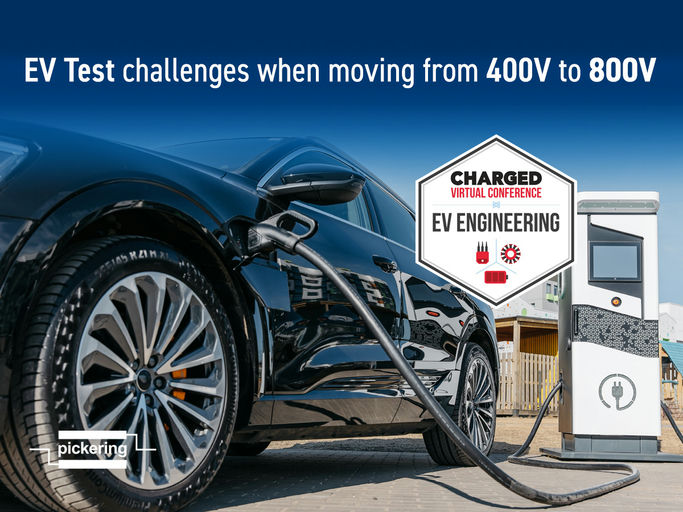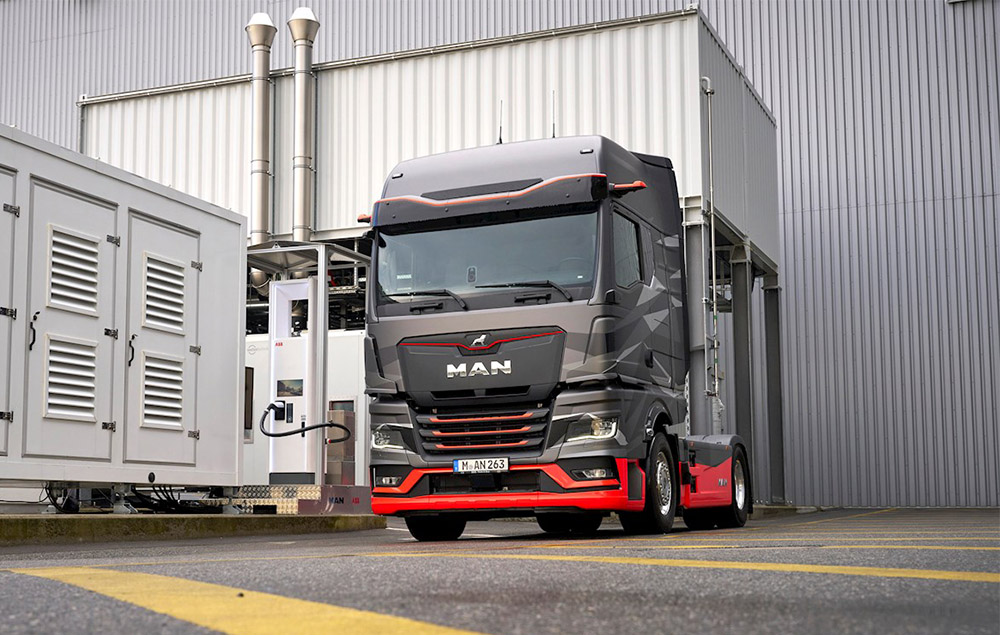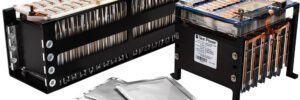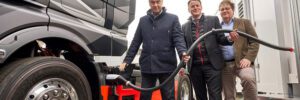Randy Parker, Hyundai Motor America’s CEO, says the Korean automaker wants to offer options but is “all-in on EVs.”
Source: Electric Vehicle News
Chevrolet Equinox Plus Is A PHEV That's Probably Headed To The U.S.
Chevrolet’s forthcoming PHEV crossover will use a battery made by BYD.
Source: Electric Vehicle News
Here's How Difficult It Is To Clean A Tesla Cybertruck After A Long Road Trip
It’s far from the simple bucket, soap and rag that’s often used on painted cars.
Source: Electric Vehicle News
Energy optimization of battery testing laboratories (Webinar)
A crucial factor for achieving both innovative breakthroughs and sustainability objectives is the energy optimization of battery testing laboratories, a key factor in reducing CO2 emissions and lowering operational costs.
In this webinar, presented by Keysight Technologies at the Spring Virtual Conference on EV Engineering, April 15-18, 2024, we will analyze how the efficiency of individual components contributes to the overall laboratory efficiency, how to interpret data points, and what levers could be used to optimize.
Join us to learn more about the importance of battery lab efficiency in supporting a green future and maintaining economical operations.
Other sessions at our Spring Virtual Conference include:
EV Test Challenges When Moving From 400 V To 800 V

With the EV industry transitioning from 400 V to 800 V, it will be vital to know how your test system can scale to meet the many shifting requirements.
Join this session presented by Pickering Interfaces to learn how a modular, industry-standard-based test system can meet your current demand for 400 V while also future-proofing for emerging 800 V standards.
We’ll discuss the specifics involved with BMS testing, high-voltage switching, and hardware-in-the-loop (HIL) simulation that can make or break the architecture of your complex EV systems.
See the full session list for the Spring Virtual Conference on EV Engineering here.

Broadcast live on April 15-18, 2024, the conference content will span the EV engineering supply chain and ecosystem, including motor and power electronics design and manufacturing, cell development, battery systems, testing, powertrains, thermal management, circuit protection, wire and cable, EMI/EMC and more.
Source: Electric Vehicles Magazine
Sion Power raises $75 million to commercialize its Licerion tech for lithium metal EV batteries
Sion Power, a developer of next-generation batteries for EVs, has secured $75 million in a Series A funding round led by battery manufacturer LG Energy Solution.
Sion Power will use the funding to validate its Licerion technology technically and commercially. The company plans to build a fully automated line to make large-format lithium metal cells for automobile OEMs and cell makers to test and improve.
Sion Power’s Licerion technology uses compression in a lithium metal battery, which the company says will enhance safety, lifetime and recharging rates. Licerion has been demonstrated in large energy capacity battery cells (up to 20 Ah) and it is currently in development to reach 56 Ah.
“Licerion directly addresses the anxiety that consumers feel about finding chargers by delivering up to twice the energy of conventional lithium-ion,” said Tracy Kelley, Sion Power’s CEO. “The support from our investors is a testament to how mature our technology is and the value of our approach towards enabling lithium metal cells.”
“We’ve invested in Sion Power because its strong IP portfolio is critical to enable lithium metal technology on a commercial basis. Its technology is superior to that of a conventional battery [and the company has] a scalable manufacturing process that offers a faster and lower-cost solution,” said Jim Simons, Chairman of investor Euclidean Capital.
“Sion Power brings lithium metal anodes and their significant benefits to the automotive industry. Its technology will greatly expand driving ranges at a reduced cost,” said Stefan Jacoby, Sion Power’s Chairman of the Board.
Source: Sion Power
Source: Electric Vehicles Magazine
Ford plans new electric pickup and SUV, starting around $25k
The higher purchase prices of EVs now represent the number-one obstacle to mass adoption. Automakers have figured this out (some a bit later than others), and are adjusting their strategies to bring more low-priced EVs to market.
In February, Ford CEO Jim Farley announced that his company has been quietly working on a low-cost platform for smaller EVs for the last two years. Now we learn that two of the first EVs to be built on the platform will be a small electric pickup and SUV, with starting prices around $25,000. The platform will feature low-cost LFP batteries, and the first model is expected to launch in 2026. Meanwhile, plans for a huge three-row electric SUV have been shifted to the slow lane.
During a recent Wolfe Research conference, Farley highlighted one of the main trends driving the move towards cheaper EVs: looming competition from Chinese automakers. “As the CEO of a company that had trouble competing with the Japanese and the South Koreans, we have to fix this problem,” Farley said, adding that Ford needed to “bet on a smaller EV platform.”
Farley also hinted at doubts about the conventional wisdom that Americans will only buy large vehicles. Big-ass trucks like the F-150 Lightning are expensive to build, so anything larger than the Ford Escape needs to be functional to justify its price, whereas an Escape-sized EV or smaller “completely works,” and offers “dramatically better operating cost” than the smaller gas-powered vehicles that US automakers abandoned a few years ago.
Source: Electrek
Source: Electric Vehicles Magazine
ABB E-mobility and MAN demonstrate megawatt charging on electric truck
The Megawatt Charging System (MCS) is a new charging standard that enables super-fast charging for heavy-duty electric vehicles (up to 3.75 MW, compared to a maximum of 400 kW with CCS). The international standardization process is expected to be completed this year, and companies are already close to commercial implementation. Electric truck expert Rustam Kocher told Charged that MCS is “a game-changer” that “should shunt hydrogen off as an expensive also-ran.”
MAN Truck & Bus, one of the truck OEMs that has implemented MCS, recently demonstrated MCS charging with a MAN eTruck at the company’s development center in Munich. The heavy-duty truck was charged at a level of over 700 kW and 1,000 A using a charging station from ABB E-mobility, one of the first megawatt charging points in Germany.

MCS chargers are intended to provide a fast charge for an electric truck or coach during the driver’s legally prescribed driving break. The new technology complements existing depot charging solutions, which provide a slower overnight charge.
“Bavaria is on the way to the mobility of the future,” said Bavarian Minister President Dr Markus Söder, who was present at the demo. “Today, the starting signal was given for the first megawatt charging station for electric trucks at MAN. This is state-of-the-art ecological and economical e-mobility that is being developed in Bavaria.”
“With MCS, sustainable long-distance transport with trucks and buses will be possible in the near future. We have proven that today, even if we are still showing a prototype here,” said Michael Halbherr, CEO of ABB E-mobility. “With the new MCS standard, we have not only doubled the amperage but also the charging capacity within just a few years.”
“The goal is 30,000 MCS charging points in Europe by 2030, around 4,000 of them in Germany,” said Alexander Vlaskamp, CEO of MAN Truck & Bus. “We put one of the first charging points into operation today. The electric trucks are available, megawatt charging is working. We now need clear signals from politicians, not least to build trust among our customers in favor of electrification.”
Source: ABB
Source: Electric Vehicles Magazine
Flexible Power Systems raises £2.7 million to bring electric fleet management platform to market
UK-based electric fleet software developer FPS has received a combination of equity investment and a £1.49-million loan from national innovation agency InnovateUK to advance the commercialization of its FPS Operate EV and charger management platform for commercial vehicle fleets and expand its use range.
FPS Operate was originally developed for the van and transport refrigeration fleets of UK retail company John Lewis and UK supermarket chain Waitrose. It is slated for commercial truck deployment by summer 2024. The platform integrates and operationalizes charge points, vehicles, building energy management and logistics software systems. The data is used for automated vehicle-task matching, smart charging, uptime reporting and management, and increasing EV ROI.
“Many fleets are only now getting to grips with significant challenges like power availability, variable range and increased scheduling complexity that can come with an EV transition. We began investing in FPS Operate to provide fleet operators with the solution to address them,” said Allan Gray, Chief Financial Officer at FPS.
Source: FPS
Source: Electric Vehicles Magazine
Thank Toyota's Lobbying For The New, Looser EPA Emissions Rules
Meanwhile, Hyundai plans a $51 billion new investment into EVs, and we look at Nissan’s plans for them as well.
Source: Electric Vehicle News
2023 Fisker Ocean Now Priced From $24,999
The top-of-the-range 2023 Fisker Ocean Extreme is now cheaper than a base Tesla Model Y.
Source: Electric Vehicle News






